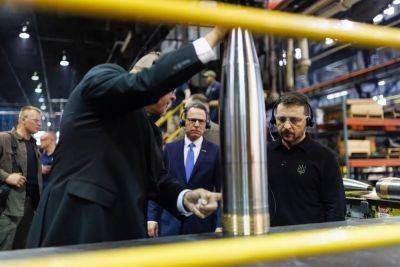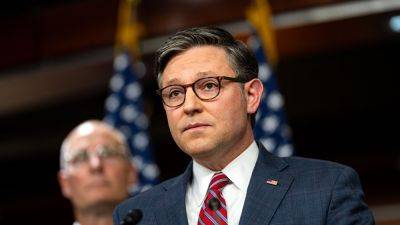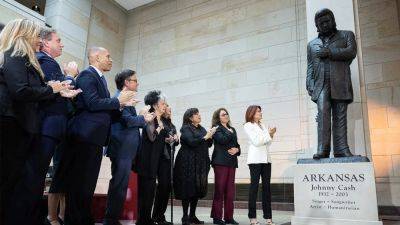US Capitol statue of Johnny Cash depicts Arkansas' history and progress
When tourists visit the U.S. Capitol, they'll now be treated to seeing a statue of the legendary musician Johnny Cash.
Cash is the first musician ever to be honored with a statue as part of the Statuary Hall collection, which includes two statues donated by each state to honor notable figures in state history.
"Johnny Cash is the perfect person to be honored in that way. He was a man who embodied the American spirit in a way that few could," said House Speaker Mike Johnson at the unveiling ceremony on Tuesday.
Johnny Cash, born in Kingsland, Arkansas in 1932 during the Great Depression, is most often associated with country music, but his body of work went beyond any one genre.
"At different times, he was country blues, rock and roll and gospel," said House Democratic Leader Hakeem Jeffries. "He was a trailblazing, transformational and trendsetting figure."
The bronze statue shows Cash with a guitar slung across his back and a bible in his hand, a symbol of his enduring faith.
"He was a man of powerful Christian faith, but with the mind of a mystic, who respected all individual paths to God and all the mysteries of the universe," said his daughter, Roseanne Cash, at the ceremony. She was one of 100 Cash family members at the event.
"Dad was a man of wonderful contradictions," she said. "He opposed the war in Vietnam, and he went to perform for the troops. He performed for Nixon at the White House and respectfully declined to sing one of the songs the president requested, which criticized welfare recipients because dad thought it denigrated the poor."
Johnny Cash historian Mark Stielper told NPR Cash used his music as a vehicle for delivering messages.
"He sang at prisons. He was an early pioneer in singing and







